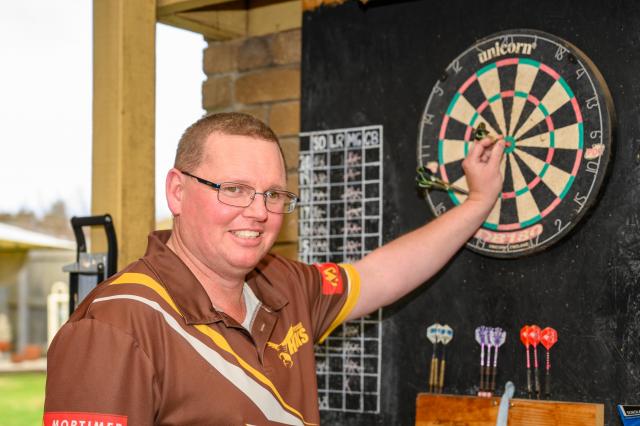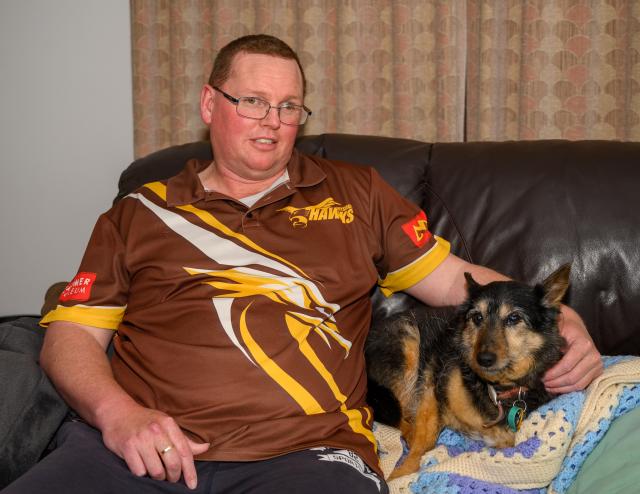
This week is National Stroke Week. Justin Flynn talks to Clifton Springs stroke survivor Shane Datson about his journey and how a positive attitude can help in even the worst situation.
Shane Datson was just months away from his 40th birthday, had a good job, loved playing golf and cricket and then it all happened.
He was on a cross-trainer at the gym and his right arm “fell off” the machine. He went to dismount and couldn’t move his right foot.
For the next 10 minutes he tried to let others know he was in trouble, but he couldn’t speak. So he stood there on one foot nestled against the machine trying to get eye contact with someone…anyone.
Several people glanced in his direction, but turned away immediately because they felt uncomfortable.
“I finally got one woman to look at me, but she just put her earbuds back in and kept exercising,” he says.
“I tried to get her attention again and she didn’t look, so I thought ‘I’m just going to have to make you feel uncomfortable and stare at you until I get your attention’.”
Eventually the woman got help and it took five people to get Shane off the cross-trainer.
He was rushed to Geelong Hospital before transferring to Royal Melbourne Hospital.
“You’re not really thinking, because to me it was unexpected,” he says.
“You’re not really thinking it’s anything. You’re thinking ‘oh well we’ll go and get it checked out and I’ll be right to go tomorrow’.”
But he wasn’t right.
“I became really bad at Royal Melbourne, I couldn’t talk or use my voice,” he said.
He deteriorated over the next few days to the point where doctors couldn’t find any answers.
Eventually Shane ended up at McKellar Centre in Geelong where he was diagnosed with cerebral amyloid angiopathy, a condition in which proteins called amyloid build up on the walls of the arteries in the brain. It is rarely seen in patients under the age of 55 and is typically fatal in those over 60.
Shane would then be put through months of rehab, including learning how to walk again, but never once felt sorry for himself.
“I was laying in bed not being able to do anything and said ‘this isn’t meant to be, I’m not going down without a fight’,” he says.
“He deteriorated and had nothing for a good two days and then it started coming back again,” Shane’s partner Tam says.
“I could still swear though,” Shane quips.
Shane was in a driveway accident at home when he was four. The back wheel of the family car went over his head and he lost his left eye and sense of smell.
Two years later he had viral meningitis and then got gout and kidney stones and several broken limbs.
And then the stroke but there was still no self-pity.
“I think I have been very lucky in life,” he says.
“Mum said when I had viral meningitis that she couldn’t take a photo of me without me having a smile on my face. You just have to look for positives in life. You have to draw a positive from every negative you have.”
One of the things Shane wanted to do badly was drive again.
He got his licence back in April last year, but had to learn how to drive left-footed. The process was made simpler with years of experience driving a left-hand drive golf buggy around.
“It takes a lot of work to get back what I’ve gotten back, It doesn’t come easily,” he says.
“You’ve got to look for the positives. There are going to be a lot of negatives, but if you can take a little positive out of that then you find it makes it a lot easier.
“The positive for me was that I had to get my licence back. It’s going to happen. You just have to believe in yourself that you can do it.”
Shane says there is only one goal he hasn’t been able to properly achieve.
“To flip the bird at the missus,” he laughs.
“Everyone that’s heard it has asked ‘have you been able to do it?’, but I am still struggling with the little finger, the ring finger and the rude finger to work by themselves.”
Shane has one message to family members who are dealing with a loved one’s initial stroke diagnosis.
“I could understand everything, but couldn’t communicate,” he says.
“I got people to give me a yes and no question where I could shake or nod my head.
“I had an older fellow who had a fall come in at McKellar and his family were there, talking loudly to him and he couldn’t respond.
“I went over and said to them to ask questions in this way. He understands everything you’re saying, but he can’t talk. If you ask him questions he needs to answer, ask him this way. The family turned to him and said ‘do you understand what he is saying?’ and he shook his head with the biggest smile on his face and the family were absolutely stoked that I went over and told them.”
Shane’s advice for any stroke survivor who is just starting their journey to recovery is to think positively.
“It seems like it was quick but I look back now and it’s three years this October,” he says.
“It’s not an easy road. You have to take the good with the bad but there is light at the end of the tunnel.
“Do everything you can. What got me through was looking for positives. There might be something bad, but there is always a positive you can exchange it for. It’s not easy sometimes to find that positive, but if you can find it and dig it out, it will be a lot easier for you.”







